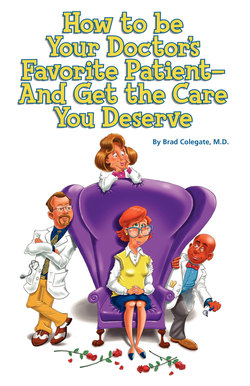Читать книгу How to be Your Doctor’s Favorite Patient - David Claytor - Страница 12
На сайте Литреса книга снята с продажи.
The White Glove Patient
ОглавлениеMrs. Lucinda Cray had seen a lot of changes in her 71 years of living, and she herself had changed a lot, but one thing she wasn’t about to give up was wearing her white gloves when out in public. She was aware that people thought it looked snobbish and peculiar, but she wasn’t a snob–it was just that all those naked, sweaty hands embracing each other in the social ritual of handshaking seemed to her to be highly uncivilized. Besides, she hated looking down at all those liver spots on the back of her hands. Thank goodness she didn’t have to look at her own face except when she was putting on her make-up in the morning. If she looked even half as old as her best friend of 50 years, Mayvis Johnson, she’d rather not be reminded of it.
She had dozens of pairs of gloves, and it amazed her how frequently she had to change them. No matter how careful she was, they never stayed clean more than a day. It was such a dirty world. Now here she was in Dr. Todd Peterson’s office with time on her hands, and dust on her fingers. While waiting for him to come in and give her a refill for her thyroid medicine, she’d run her right index finger along the back of her chair and come away with the tip covered in gray fuzz.
“Don’t you ever clean in here?” she asked abruptly as her doctor entered the room, wagging her incriminatingly dusty finger at him.
Dr. Peterson’s cheeks flushed red. “Well, yes, of course. I mean, the office staff cleans the rooms after every patient, and then more thoroughly as needed.”
“I’d say it needs it now,” she declared. “You’d think a doctor’s office, of all places, would be clean.”
If you look hard enough, dust and germs are everywhere in the environment, including your doctor’s office. Unless you happen to be allergic to dust, it’s not a health hazard, and there’s no cause for alarm if you see some in the office. Blood and bodily secretions, however, are another matter; there are strict guidelines that must be followed for dealing with those. When it comes to surgical procedures, materials and equipment should be not only clean but also sterile. In reality, you and your physician, not the physical environment, are the greatest biohazards in the office. So not only will your physician wash his hands before and/or after his encounter with you, but so should you. And save the white gloves for the opera.
Do expect your physician’s office to be tidy, but not spotless.
Do expect surgical supplies and equipment to be sterilized.
Don’t handle something that looks like it may be contaminated with bodily fluids, but do let the physician or office staff know about it.
Do wash your hands after you leave the office, to reduce the chance of picking up or transmitting an infection.
